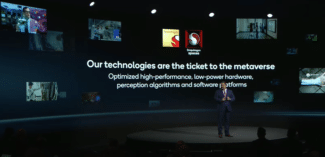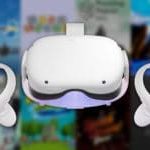Is Meta’s approach to subsidizing upfront VR headset hardware cost achieving mass market adoption?
A comment from the CEO of Quest 2 chip provider Qualcomm suggests the headset formerly known as Oculus Quest 2 is well on its way. Qualcomm CEO Cristiano Amon said during an investor day livestream that “Oculus Quest 2 was 10 million units,” with the comment representing some of the strongest language we’ve heard yet about the market adoption for the headset Meta sells starting at $299. Credit to Anshel Sag for noting the comment, which can be seen at at 2:15:40 in the video below:
Quest 2 started shipping from Facebook in late 2020 and, in August 2021, future CTO Andrew Bosworth said he was “convinced” the company would reach its goal of 10 million VR users sooner than they anticipated. While Sony continues to build its PS5 install base for a successor wired PlayStation VR headset, the original PSVR for PS4 (and PS5) cleared 5 million headsets sold through the end of 2019. Quest 2 has been eating share of PC VR usage on Steam month by month, with Valve’s most recent hardware survey showing more than 35% of headsets on Steam are connecting to PC VR games from Meta Quest 2. The majority of Quest 2 owners, however, are unlikely to own VR-ready PCs — meaning that Quest 2 is not just the leading PC VR headset, but that substantial userbase is just a fraction of the overall Quest market opportunity for developers.
We’ve reached out to Meta and Qualcomm for additional comment and will update this post if we get details.
Update from a Qualcomm Spokesperson: “During Qualcomm’s Investor Day event, CEO and President Cristiano Amon highlighted the momentum of the XR business and stated that Quest 2 has shipped an estimated 10 million units. This number is an average of third-party market size estimates from industry analysts, and wasn’t meant as an official disclosure of sales numbers by Meta or Qualcomm. Snapdragon XR Platforms power over 50 commercial devices, including Quest, and Qualcomm’s early investments have established Snapdragon as the platform of choice for connecting physical and digital spaces.”





